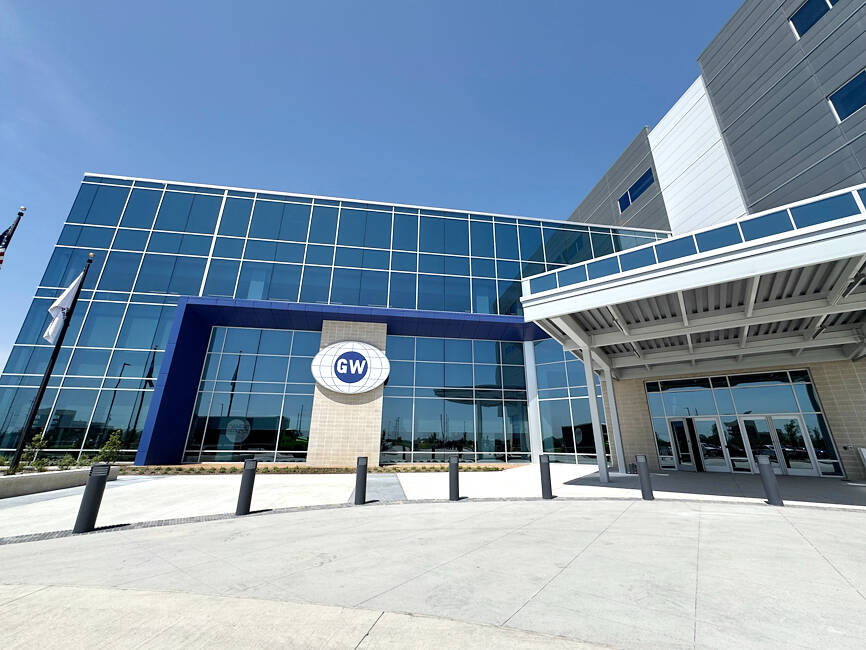GlobalWafers Co (環球晶圓), the world’s third-largest silicon wafer supplier, yesterday said that customers’ inventory corrections are nearing completion, and it expects full-year revenue to exceed last year’s level, excluding the effects of foreign exchange rate fluctuations.
The company expects modest revenue growth next year, supported by a continued recovery in the semiconductor industry, driven by demand for artificial intelligence (AI) and high-performance computing (HPC) applications.
“We believe that the most challenging phase is behind us,” GlobalWafers chairwoman Doris Hsu (徐秀蘭) told an online investors’ conference.

Photo courtesy of GlobalWafers Co
“The pace of recovery remains uneven across applications... AI and data center demand continues to drive investment in advanced nodes, while the PC and mobile segments remain muted, and we are gradually beginning to see positive signals from the automotive and industrial sectors,” Hsu said.
GlobalWafers’ revenue in the first half of this year expanded 3.9 percent annually to NT$31.6 billion (US$1.06 billion) — the third-highest first-half performance in the company’s history.
Although supply chain inventories are gradually declining, customer procurement decisions are increasingly influenced by geopolitical tensions and tariff-related considerations, prompting a shift toward regional sourcing strategies, the company said.
A potential challenge looms if Taiwanese semiconductor companies are subjected to a 20 percent tariff following the conclusion of a US Section 232 investigation under the Trade Expansion Act of 1962, as the company’s rivals are to be levied at a lower rate of 15 percent, Hsu said.
However, GlobalWafers said its global manufacturing footprint and cross-site product qualifications with customers provide the flexibility to shift production and shipments to regions with optimized cost structures.
The company is accelerating qualification processes and ramping up production at overseas sites to ensure resilient local supply, Hsu said.
If strong demand in the US persists, the company would consider advancing the next phase of capacity expansion to further enhance local support, she added.
GlobalWafers also operates production facilities in Taiwan, Japan, South Korea and Europe.
The company reported second-quarter net profit of NT$1.68 billion, up 15 percent from NT$1.46 billion in the previous quarter. However, net profit declined 41 percent from NT$2.88 billion a year earlier.
Earnings per share rose to NT$3.52 last quarter, up from NT$3.05 in the previous quarter, but down from NT$6.02 a year earlier.
Gross margin declined to 25.8 percent, compared with 26.4 percent in the first quarter and 32.3 percent in the same period last year, attributable to higher depreciation expenses and increased costs associated with the company’s global capacity expansion plans.
Factory utilization improved on a quarterly basis, with the loading rate of 12-inch silicon wafer production lines rising to more than 90 percent, and 8-inch lines operating at about 80 percent. Equipment usage for small-diameter wafers, such as 6-inch wafers, reached 70 percent, the company said.

In Italy’s storied gold-making hubs, jewelers are reworking their designs to trim gold content as they race to blunt the effect of record prices and appeal to shoppers watching their budgets. Gold prices hit a record high on Thursday, surging near US$5,600 an ounce, more than double a year ago as geopolitical concerns and jitters over trade pushed investors toward the safe-haven asset. The rally is putting undue pressure on small artisans as they face mounting demands from customers, including international brands, to produce cheaper items, from signature pieces to wedding rings, according to interviews with four independent jewelers in Italy’s main

Japanese Prime Minister Sanae Takaichi has talked up the benefits of a weaker yen in a campaign speech, adopting a tone at odds with her finance ministry, which has refused to rule out any options to counter excessive foreign exchange volatility. Takaichi later softened her stance, saying she did not have a preference for the yen’s direction. “People say the weak yen is bad right now, but for export industries, it’s a major opportunity,” Takaichi said on Saturday at a rally for Liberal Democratic Party candidate Daishiro Yamagiwa in Kanagawa Prefecture ahead of a snap election on Sunday. “Whether it’s selling food or

CONCERNS: Tech companies investing in AI businesses that purchase their products have raised questions among investors that they are artificially propping up demand Nvidia Corp chief executive officer Jensen Huang (黃仁勳) on Saturday said that the company would be participating in OpenAI’s latest funding round, describing it as potentially “the largest investment we’ve ever made.” “We will invest a great deal of money,” Huang told reporters while visiting Taipei. “I believe in OpenAI. The work that they do is incredible. They’re one of the most consequential companies of our time.” Huang did not say exactly how much Nvidia might contribute, but described the investment as “huge.” “Let Sam announce how much he’s going to raise — it’s for him to decide,” Huang said, referring to OpenAI

The global server market is expected to grow 12.8 percent annually this year, with artificial intelligence (AI) servers projected to account for 16.5 percent, driven by continued investment in AI infrastructure by major cloud service providers (CSPs), market researcher TrendForce Corp (集邦科技) said yesterday. Global AI server shipments this year are expected to increase 28 percent year-on-year to more than 2.7 million units, driven by sustained demand from CSPs and government sovereign cloud projects, TrendForce analyst Frank Kung (龔明德) told the Taipei Times. Demand for GPU-based AI servers, including Nvidia Corp’s GB and Vera Rubin rack systems, is expected to remain high,